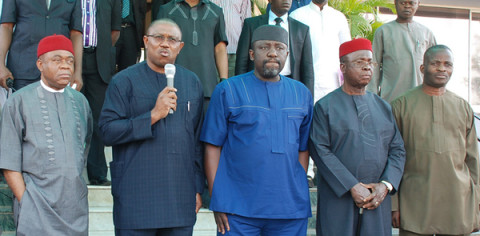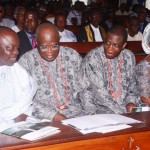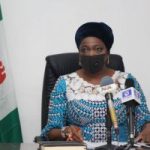Opinion: Arab Contractors As Obstacle To Economic Recovery Of The South-East Of Nigeria
Articles/Opinion, Latest Headlines Thursday, October 9th, 2014
By Chief (Sir) Don Ubani, Okwubunka Of Asa
The people of the defunct Eastern Nigeria were on a high socio-economic pedestal before the advent of the Nigerian/Biafran war. Before the war, when oil and gas had not become the economic mainstay of Nigeria, the economy of the East was based on agriculture, mining, commerce, industry, tourism technology, transport, professionalism, etc.
As at 1963, the economic growth rate of the Eastern Region had been described as the fastest in sub-Saharan Africa. In the field of agriculture, the governments of Dr. Nnamdi Azikiwe and Dr. Michael Okpara placed premium on cultivation and production of palm produce. Coal was being mined in very large commercial quantity at Enugu.
It was because of coal in Enugu that the British Colonial government had completed the construction of the Port-Harcourt-Enugu railway as early as 1916 to facilitate the transportation of coal from Enugu tothe Sea Port at Port-Harcourt.
During that era, the people of the East, particularly the Igbo, were known for their vigorous exploits in the area of commerce. Even uptil this moment, the Igbo are inseparably associated with commerce, especially buying and selling. In addition to small and medium scale industries established by individual eastern industrialists, the Government of the defunct Eastern Nigeria established some big industries such as the Niger cement Industry at Nkalagu, the Golden Guinea Breweries at Umuahia, a Ceramic Industry at Umuahia, two big texile mills, each at Aba and Onitsha.
The Government also invested very meaningfully and lucratively in tourism. Apart from PresidentialHotels at Enugu and Port-Harcourt, each Urban area in the region had a branch of the government-owned Phoenix Hotel. The Hotels at Umuahia and Aba that are presently known as Abia Hotels were formerly branches of Phoenix Hotel.
The economy of the region was so vibrate that the Eastern Regional Govenrment was the first to successfully initiate the establishment of an indigenous university; the University of Nigeria, Nsukka in 1955, which formally opened for academic studies on the 7th of October, 1960, barely a week after Nigeria’s Independence on October 1st, 1960.
Without mincing words, the period between 1960 and 14th of January, 1966 marked the former Eastern Region of Nigeria as an economic Eldorado. Unfortunately and most regrettably, two things were to conspire against the economic growth of the region; (1) The Nigerian Civil War which originated principally from the political crisis in the defunct Western region between Chief Obafemi Awolowo and Chief Samuel Akintola and (2) Corruption amongst the country’s ruling elites
The Nigerian Civil War was waged and fought within the boundaries of the former eastern region for thirty consecutive months from 1967 to 1970. As would be expected, everything the people of the region, especially the Igbo, had laboured to achieve in Nigeria was not only forced to come to a halt but was completely ruined and destroyed. The few Igbo that were extremely lucky to have survived the war came back to Nigeria penuriously devastated. The economy of the Igbo was lost, though the Igbo survivalist instinct remained, as characteristic of the Igbo, very high. They just had to start life afresh.
Before the civil war, corruption had raised its ugly head in matters of public administration. But at the end of the civil war, with the military being in charge of the affairs of the country, corruption assumed a very destructive dimension. Corruption manifested itself in uncountable ways. Contracts were awarded and paid for yet they would not be executed. Key areas that were affected by this cankerworm were road construction, the Nigerian railways, and the power sector. Roads, the railway and electricity were the principal factors that were responsible for the fast growth of the economy of the erstwhile region. With the paralysis occasioned on the reviving economy of the people of the South-East, the entrepreneurial spirit of the people nose-dived while many South-Easterners were compelled to seek for green pasture outside their zone of nativity.
The most devastating of the fortune of the people of the South-East has been the gradual and systematic collapse of Federal roads in the zone. The collapse got to an extent where a journey from Aba to Enugu, which under normal circumstance should not take more than two and half hours, took more than six hours. The same frustration played out on Enugu-Onitsha road. Onitsha–Owerre-Aba road was not spared. The collapse of these Federal roads, not to talk of Aba-Ikot-Ekpene and Umuahia-Ikot-Ekpene roads, has made a mess of governance in the country and nonsense of life in the South-East.
The misery and agony emanating from the collapse of these Federal roads, as would be expected, compelled the Governors of the South-East geo-political zone, under the able leadership of Governor T.A. Orji of Abia State to rise and champion the cause of their people. President Goodluck Jonathan, being a listening and humane father of the Nigerian State, responded to the request of the leaders of the South-East. The Enugu-Okigwe-Umuahia-Aba portions of the Enugu-Port-Harcourt Express roadhas been awarded for rehabilitation to two construction companies. Enugu-Umuahia is awarded to Setraco and the company is doing marvelously well. Whoever that plies that section of the road would surely appreciate the commitment of Setraco to delivering effectively on the terms of the road contract awarded by the P.D.P-led Federal Government.
But on the extremity of contradiction, the Arab Contractors, which started work from the Abia Tower axis of the road more than a year ago, is yet to complete work even on one lane of the road upto Ubakala junction.
The lackadaisical attitude to work on the project so far exhibited by the Arab Contractors has forced many observers to conclude that the company has a hidden religious agenda against the people of the South-East who are ninety-nine point nine (99.9%) percent Christians or that the company is, in every material particular, ill equipped and incompetent.
As at present, Arab Contractors have assumed a very worrisome dimension and any one that infers that the company is all out to frustrate the economic recovery of the South-East may not, after all, be far from the truth. It, therefore, follows that the Federal Government that awarded the contract to Arab Contractors may, of necessity, review the contract in order to save the traumatized people of the South-East who are ever ready to support the administration of President Goodluck Ebele Azikiwe Jonathan.
Chief (Sir) Don Ubani; ksc, JP
(Okwubunka of Asa)
Related Posts
Short URL: https://www.africanexaminer.com/?p=18471






















